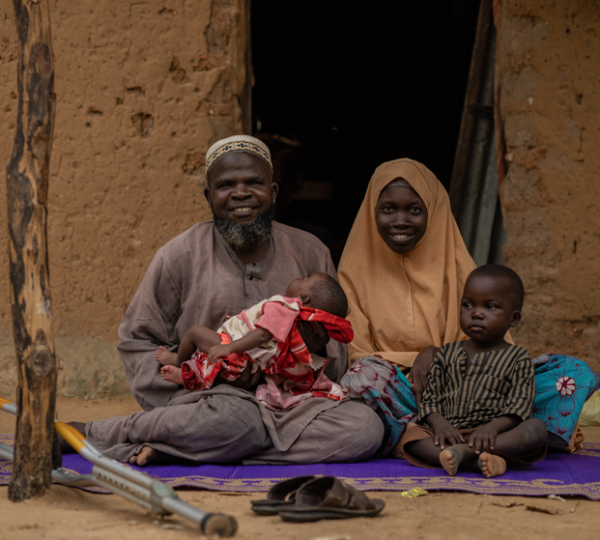Empowering Futures: Catalysts for Change in Nigeria’s Contraceptive Uptake
By Ramatu Iyimoga, Foluwakemi Ogunkua, Fatima Mohammed Mu’azu and Farouk Abdullahi.
Unlocking a brighter future often hinges on collaboration and understanding within a community. In the heart of northern and southern Nigeria, where traditions and beliefs are a stronghold, two remarkable initiatives for married and unmarried adolescent girls have taken root – Under the Adolescent 360 (A360) which is designed to give girls (married and unmarried) a holistic package when it comes to adolescent health by creating an enabling environment to improve access to sexual and reproductive health services (SRH) lies the Matasa Matan Arewa (MMA) programme. This initiative created through human-centered design (HCD) is targeted at addressing barriers hindering voluntary access to modern contraceptive methods amongst adolescent girls aged 15-19 years. The Matasa Matan Arewa programme targets married adolescent girls in northern Nigeria. This groundbreaking endeavour by Adolescent 360 Nigeria (A360) is illuminating the path towards voluntary access to contraceptive methods for adolescent girls. This journey transcends health, weaving through wealth and personal agency, fueling the aspirations of these young women.
Pioneering Change: The MMA Programme
Navigating the complexities of voluntary contraceptive uptake among married adolescent girls aged 15-19, the MMA program has emerged as a beacon of hope. It seeks to dismantle barriers, illuminate choices, and empower these girls to seize control of their destinies. While tradition might have once cast shadows, these initiative shines a light on progress.
The MMA is currently implemented in four states in the northern part of Nigeria – Kaduna, Nasarawa, Kano and Jigawa. MMA creates an enabling environment for married adolescent girls through targeted one-on-one outreach by female mentors through Life Family and Health sessions (L.F.H) where girls learn about topics that are applicable to them in gaining life and vocational skills and also enable them see how contraception can help her achieve her life goals. Also, their husbands through Male Interpersonal Communication Agents (Male IPCAs), community and religious leaders can help to increase voluntary contraceptive uptake, which is a tool that would support adolescent girls in achieving their goals.
The Key Influencers: Husbands and Community Leaders
At the heart of this transformation lie individuals who wield substantial influence – husbands and community and religious leaders. These figures, are often the keys to decision-making and shape the destinies of not just the married adolescent girls, but entire communities.
Picture this: a married adolescent girl, resolute in her desire for family planning, stymied by the words “miji na baya so” – my husband is not in support. This reveals a profound truth – the crucial role husbands play in this narrative. But how do we secure their buy-in? The answer unfurls through the power of community and religious leaders, and their peers.
Husbands: A Guiding Force
The impact of husbands emerges as a force to be reckoned with. Wives turn to their husbands, seeking permission, wisdom, and guidance towards their life choices. in this case, it forges a path toward acceptance and understanding. In a culture where husbands are seen as keepers of families and ultimate decision-makers, their influence is transformative in the uptake of modern contraceptive methods.
Community and Religious Leaders: Guardians of Change:
Traditional and religious leaders, revered voices in Northern Nigeria, hold sway over decisions that resonate through the lives of many. Their teachings, their sermons, their guidance – these are the building blocks of change. A once skeptical husband, after the counsel of community and religious leaders, becomes a harbinger of support towards the uptake of modern contraceptive methods, cascading a ripple effect through his peers.
A360’s Ingenious Strategy: Bridging Hearts and Minds:
The A360, through its MMA initiative, devised an ingenious strategy that dances on the fine line between tradition and progress. In states like Kano, Kaduna, Jigawa, and Nasarawa, husbands are engaged through sessions led by Male Interpersonal Communication Agents (Male IPCAs) alongside trained community and religious leaders. These collaborative sessions, adorned with a tailored male discussion flip chart, are reservoirs of information on family planning and child spacing. The hearts of husbands, once swayed, receive referral cards, a tangible bridge to their wives’ empowerment.
This is the story of Alhassn Umar : A beneficiary of the Matasa Matan Arewa program.
Meet Alhassan Umar, the husband of a 17-year-old adolescent girl, who got pregnant shortly after the birth of her first child. On giving birth to the second child, Alhassan’s wife experienced postpartum complications this was indeed a trying time for Alhassan and his family. During this period, Alhassan learnt about the Matasa Matan Arewa (MMA), he then decided to take his wife to the health facility in his community to take up a contraceptive method. Alhassan later became a Male interpersonal and communication Agent (Male IPCA) in his community engaging with community leaders and husbands of young adolescent girls ages 15-19, mobilising, sensitising and educating them on family planning methods and referring these girls to the facilities to take up a contraceptive method through their husbands.
“I took my wife to the health facility to take up a method that lasted 3 years and when we were ready to have another baby, I took her to the facility for it to be removed”- Alhassan Umar.
Champions of Change: A Collaborative Cadence
As the dust settles on the transformative journey, one truth stands resolute – husbands and community & religious leaders, are the true architects of change. Their significance reverberates beyond measure. A reimagined narrative is being etched across Northern Nigeria, where individual choices harmonise with age-old values, painting a portrait of progress, prosperity, and empowered futures. In this symphony of transformation, voices that once echoed scepticism now resonate with support. A360 has successfully engaged 452,634 husbands and 1,024 community and religious leaders. The MMA programme is more than a project; it’s a testament to the power of collaboration, understanding, and the unwavering commitment to a brighter tomorrow. Through husbands and community leaders, the legacy of change is etched into the very fabric of Northern Nigeria. Through this harmonious symphony of voices, over 373,701 adolescent girls now embrace contraceptive methods in Nigeria – a legacy that promises a vibrant, self-determined future for all.
This collaborative cadence of voices, echoing with support and understanding, illustrates the enduring legacy of change etched into the fabric of Northern Nigeria. The MMA program isn’t just a project; it’s a testament to the power of collaboration and unwavering commitment to a brighter tomorrow, where individual choices harmonise with age-old values, paving the way for prosperity and empowered futures.






